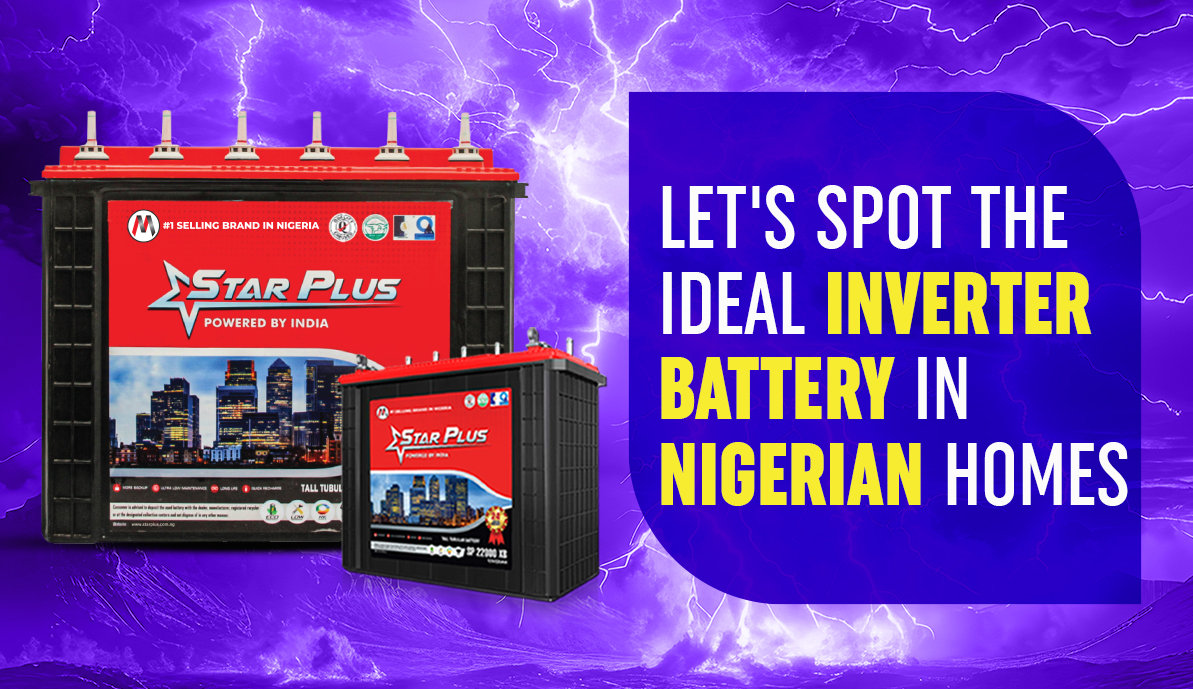The significance of an inverter battery in maintaining an uninterrupted power supply cannot be overstated. As demand for reliable power sources continues to rise in Nigeria, the need for durable inverter batteries has gradually increased.
Whether your business or household operation requires an uninterrupted power supply, high-storage inverter batteries can offer a reliable power backup solution. Although numerous options are available in the market, only suitable inverter batteries will help you fulfil this demand.
In this article, we’ll navigate through the intricacies of inverter batteries and which factors can make them ideal for your homes.
Factors Making Inverter Batteries Ideal
Understanding Power Needs
Your power needs will determine the capacity endurance of your inverters. This might determine the number and power consumption of electronic appliances that you use.
For example, if you regularly use air conditioners instead of ceiling fans, your power consumption will gradually increase. During power outages, your inverter needs to support your high-power usage so that air conditioners can sustain your daily lifestyle.
To check your power usage, you can check the power rating label of each device. Each electrical appliance displays power usage as wattage (W) on its surface or labels. By checking the wattage, you’ll know how much power your daily home appliances will consume when supported by an inverter.
Durability and Lifespan
Investing in a durable and long-lasting inverter battery will maximise your returns on investment. Significant factors like build quality, design types, and maintenance of your inverter battery will also contribute to its durability.
Look for a battery that is highly durable and can withstand long power charge and discharge cycles. High power outages in Nigeria can damage your battery plates by overheating or excessive erosion. To withstand charge-discharge cycles, choose a high-powered inverter battery designed to adjust according to heavy fluctuations in the power supply.
For instance, if you store your inverter batteries at a humid or moist temperature, their rusting propensity will increase. Rust accumulation within the vents of your inverter battery will decrease its long-term performance.
Internal Battery Designs
Internal battery designs refer to the chemistry and technology of your inverter batteries. Different types of battery chemistry, such as gel, lead-acid, and lithium-ion, possess individual power supply capacities.
As the best inverter battery manufacturer in Nigeria, we can offer you batteries that satisfy your power consumption capacity. Different types of lead-acid and gel inverter batteries generally offer durability and scalability in high temperatures.
Climate Considerations
Nigeria’s tropical and semi-arid climates impose high temperatures and humidity throughout the year. Climate considerations are necessary to understand whether your battery can withstand adverse situations.
Our inverter batteries are designed with a particular focus on Nigeria’s extreme climate. The low-maintenance aspect of our inverter batteries minimises water loss by reducing electrolyte topping. This feature will process the internal cooling of your inverter batteries without excessive water consumption.
Compatibility with Inverter Systems
The efficiency of your inverter battery is determined by its compatibility with inverter systems. Compatibility depends on the type, quality and usage of the inverter battery. If you can fit your inverter battery in both your home and factory inverter systems, it holds high compatibility.
As a user, you need to check that your battery and inverters are compatible with each other and with the rest of the system. You can also follow our maintenance guidelines to maintain product compatibility without compromising quality.
Cost Comparison Of Different Inverter Battery Capacity
The cost of different inverter batteries may vary depending on the specific model, capacity and market conditions. It is crucial to understand the cost complications of different inverter batteries. To make a budget-conscious decision, consider the following options:
- Original Purchase Price: In addition to the battery cost, the total purchasing price will include installation charges and the cost of additional accessories.
- Total Capacity: You need to evaluate the cost per unit of energy storage capacity. Calculating this aspect will assist you with higher energy usage compared to the purchasing price.
- Maintenance Costs: The high maintenance costs of your inverter batteries will determine their inefficiency in long-term power usage. We specialise in manufacturing low-maintenance inverter batteries that are fit to deliver high performance economically.
Conclusion
Choosing the correct inverter battery is not easy, but with us by your side, it won’t be. At Star Plus Battery, we believe that performance excellence arrives with durability. The best inverter battery will support both your home and business operations.
We hope that this article has helped you understand the key factors to consider when choosing an ideal inverter battery. If you are troubled by frequent power outages in Nigeria, contact Star Plus Battery for a quick power solution.



0 Comments